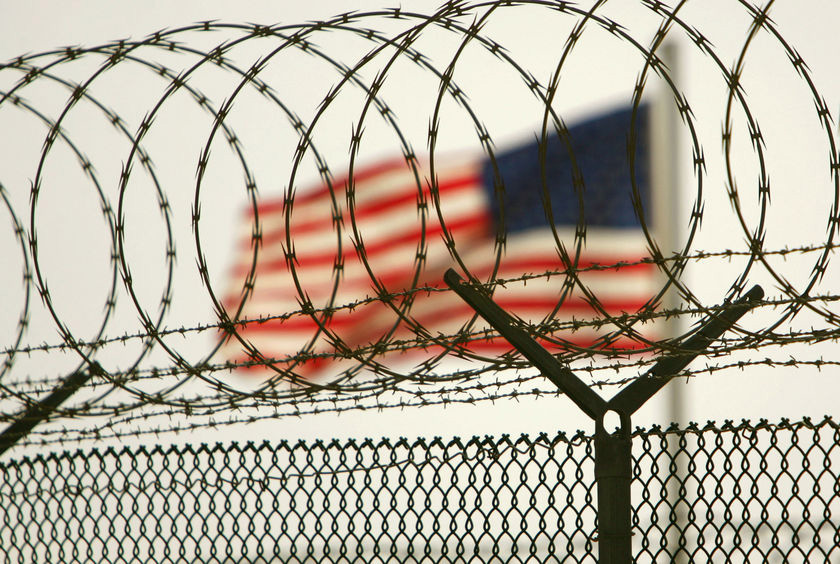The ICJ and JUSTICE, its British section, are concerned at the proposed trial arrangements proposed by the US government for detainees at Guantanamo Bay.
Letter addressed to the Attorney General’s Chambers in London [full text, PDF]
24 July 2003
Rt Hon Lord Goldsmith
Attorney General’s Chambers
9 Buckingham Gate
London SW1E 6JP
You may be aware that both JUSTICE and the International Commission of Jurists, of which we are the British section, are concerned at the proposed trial arrangements proposed by the US government for detainees at Guantanamo Bay. In this context, we very much welcome your involvement in discussions with the US government and the concessions that you have obtained, as indicated by your statement of 22 July 2003, on the outcome of talks with the General Counsel for the US Department of Defense concerning the position of the British detainees.
We welcome the announcement that the death penalty will not be sought in the cases of two of the detainees, Feroz Abbasi and Moazzem Begg, though we note press comment in, for example, yesterday’s New York Times that implied such a sentence would not have been sought by the prosecution of these ‘relatively low level suspects’. We certainly welcome the agreement of access to civilian counsel of the accused’s own choosing, subject to clearance, as well as access to UK lawyers as consultants; acceptance that communication with counsel will not be monitored or reviewed by US authorities; and that the detainees themselves will be able to determine the extent to which Department of Defense-appointed military defence counsel participate in the preparation of their cases.
We observe that your talks with relevant US officials are continuing, and your quoted commitment to ensure that the detainees “if prosecuted, are assured of fair trials that meet generally recognised principles, wherever those trials take place”. We agree that this is the important test of the military commissions if the US government is to proceed with their use to the exclusion of the usual civilian courts.
We remain gravely concerned that the rules for the proposed military commissions, as set out in the President’s Military Order of 13 November 2001, the Military Commission Order No.1 of 21 March 2002 and the 8 Military Commission Instructions of 30 April 2003, do not currently meet “generally recognised principles of a fair trial”.
In particular, we note:
(i) The continuing failure of the US to convene a competent tribunal to determine the prisoner of war status of detainees, pursuant to Article 5 of the 3rd Geneva Convention 1949;
(ii) The continuing unavailability of constitutional guarantees of due process, including the writ of habeas corpus, to persons detained by the US government outside the sovereign territory of the US (see Odah v United States, 321 F3d 1134 (DC Cir. 2003);
(iii) the absence of an independent and impartial tribunal contrary to Article 14(1) of the International Covenant on Civil and Political Rights, particularly in light of the fact that the commissions and any appeals panels will be composed of entirely of military personnel appointed by the US Department of Defense (Military Commissions Order No.1, sections 2 and 4);
(iv) The absence of any right of appeal to a civilian court as compared to the right of appeal to the federal Court of Appeals for the Armed Forces for US military personnel tried under Courts martial (see See Ch 47.12, US United Code of Military Justice);
(v) Continuing uncertainty over the extent of the restrictions imposed on the use of civilian counsel generally, including the confidentiality of communications between detainees and their legal advisors, and possible exclusion from proceedings and access to evidence on security grounds (Military Commission Order No.1, section 6(D)(5)(b), Military Commission Instruction No. 4, section 3(E)(4));
(vi) The extension of military jurisdiction over essentially non-military criminal offences, e.g. murder, perjury, hijacking (Military Commission Instruction No. 2, section 6(B)) committed not in the course of military conflict in Afghanistan but in connection with planning terrorist activities against the US.
Our concerns are set out in greater detail in a briefing of 17 July 2003 by our human rights director, Eric Metcalfe. I attach a copy. We place particular weight on the need for an appeal mechanism that allows judicial oversight by civilian courts of the military commissions. Such a right of review, both in relation to sentence and conviction, is, of course, contained within Article 14 of the International Covenant on Civil and Political Rights.
There are two further issues. One relates to all those liable to tried by the proposed commissions. We hope that the position of the UK government will be that all detainees will be the beneficiary of the amendments that you are able to negotiate and that they are not limited to UK citizens. This would certainly seem to be the logic of the position that you have adopted and we have quoted above. The second relates specifically to UK citizens. We hope that the government will be able to provide appropriate funds to pay for legal representation, whether through your department or another.
Yours sincerely,
Roger Smith
Director
email: rsmith@justice.org.uk
direct line: 020 7762 6412
JUSTICE Briefing on the Proposed Use Of Military Commissions to try Detainees at Guantanamo Bay, Cuba [full text, PDF]

